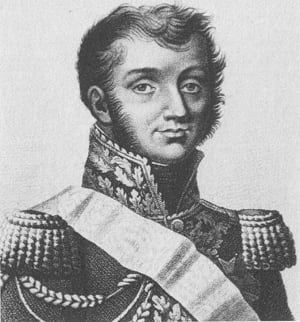28.3. 1773 General Henri-Gatien Bertrand
Categories: Personalities , Calendar
 He accompanied Napoleon into exile and remained with the French leader until his death. Already at the Battle of Austerlitz, General Henri-Gatien Bertrand became famous for his bravery. He was born on March 28, 1773.
He accompanied Napoleon into exile and remained with the French leader until his death. Already at the Battle of Austerlitz, General Henri-Gatien Bertrand became famous for his bravery. He was born on March 28, 1773.
General Henri-Gatien Bertrand was an experienced engineer, having studied at the Royal Military College of Mézieres. He joined the army at a time when Napoleon was not yet ruler of France. Bertrand gained the attention of this military leader and statesman through his involvement in the Egyptian expedition. After that, he worked for Napoleon during most of his famous battles.
At the Battle of Austerlitz in 1805 he was appointed Adjutant General to the Emperor, and was known for his coolness and bravery. Three years later he was made a count and in 1813 he was made marshal of the imperial palace.
In 1814 he went into exile with Napoleon on the island of Elba, from which they escaped after less than a year. Bertrand then commanded the Battle of Waterloo. After the defeat, he agreed to accompany the Emperor into exile on St Helena. The wife of naval officer Pulteney Malcolm, who was the commander-in-chief of the base on that island, described Bertrand as a kind husband and father.
The general's wife was Elisabeth Francoise Dillon, whose father was Arthur Dillon, who served in the French army during the Revolutionary Wars. He was executed by guillotine. Elisabeth's mother was a distant relative of Napoleon's first wife, Josephine. It was she who Elisabeth asked for help in finding her husband. She was practically introduced to Bertrand by Napoleon himself.
The couple had four children, naming the eldest Napoleon. They agreed to go into exile, together with the French leader, before it was even known which place they would actually go. They hoped, like Napoleon, that it would be England. When Elisabeth, whom they called Fanny, learned that she had to go to St Helena, she had a hysterical fit.
She feared her children would die on the island. She begged Napoleon to go alone. She even tried to jump overboard. Eventually, she resigned herself to her family's fate and hoped they would only stay on the island for a short time. She complained that there were no roads on the island, and they had no friends because they had no way and no one to socialize with. In April 1817 she gave birth to her fourth child, a boy named Arthur. Napoleon is said to have been very fond of the Bertrand children and had a swing built for them.
Bertrand served Napoleon until his death. He was eventually sentenced to death, but the English refused to extradite him. When Louis XVIII became king, he gave the general an amnesty and restored him to his official military rank. Bertrand was ceremoniously welcomed back to France in October 1821. Nine years later, he became a deputy. In 1840, the king commissioned him, but Napoleon's remains were brought to France. Bertrand died on 31 January 1844, his wife Fanny in 1836 of breast cancer.
Sources: https://shannonselin.com/, www.napoleon.org, www.frenchempire.net
The article is included in categories: